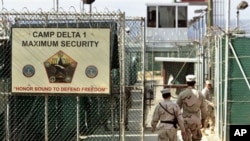The United States Senate has passed a massive defense spending bill that would authorize money for military personnel, weapons systems and the war in Afghanistan for the fiscal year that began in October. The White House has threatened to veto the bill over provisions boosting the role of the military in handling detained terrorist suspects.
The U.S. Senate passed a $662 billion defense bill, which is less than President Barack Obama proposed and less than Congress gave the Pentagon the previous year, reflecting budget constraints in tough economic times. It was not the spending amount though that prompted days of heated debate on the Senate floor, but a provision of the legislation that would require military custody of a terror suspect believed to be a member of al-Qaida or its affiliates and involved in plotting or committing attacks on the United States.
A last minute change to the provision exempted American citizens from being subject to the provision's requirements and would allow the executive branch to use its discretion on applying the provision based on national security and would also allow the president to hold a terror suspect in civilian rather than military custody. But the bill would deny suspected terrorists, even U.S. citizens, the right to trial and subject them to indefinite detention.
Reacting to the vote, a senior Obama administration official again said that any bill that challenges or constrains the president's critical authorities to collect intelligence, incapacitate dangerous terrorists, and protect the nation would prompt the president's senior advisers to recommend a veto.
One of President Obama's main challengers on detainees has been fellow Democrat and Senate Armed Services Committee Chairman Carl Levin of Michigan. Levin cited a 2004 Supreme Court ruling saying that U.S. citizens can be treated as enemy combatants.
"Al-Qaida is at war with us," said Levin. "They brought that war to our shores. This is not just a foreign war. They brought that war to our shores on 9/11. They are at war with us. The Supreme Court said, and I am going to read these words again, 'There is no bar to this nation's holding one of its own citizens as an enemy combatant.' "
Republican Senator Lindsey Graham strongly agreed.
"Here is the question for the country, 'Is it okay to hold an American citizen who is suspected of helping al-Qaida under military control?' You better believe it is okay," said Graham. "I don't believe that helping al-Qaida is a law enforcement function. I believe our military should be deeply involved in fighting these guys, at home and abroad."
Some lawmakers disagreed, such as Democratic Senator Dick Durbin, who defended the record of civilian U.S. courts in dealing with terror suspects.
"And this notion that there is no way to keep America safe without military tribunals and commissions defies logic and defies experience," said Durbin. "Since 9/11, over 300 suspected terrorists have been successfully prosecuted in Article 3 criminal courts in America. Yes, they have been read their Miranda rights [right to remain silent and right to a defense attorney], and yes they have been prosecuted and sent to prison."
Civil rights groups argue that the bill is an historic threat to liberty because it expands the authority of the president to order the military to imprison suspects without charge or trial.
The Obama administration argues that the military, law enforcement officials and intelligence agents need flexibility to act on a case-by-case basis in dealing with terror suspects.
The White House also opposes a different version of the bill passed by the U.S. House of Representatives that would limit President Obama's authority to transfer detainees from the U.S. naval base at Guantanamo Bay Cuba to U.S. federal prisons. The House and Senate versions will have to be reconciled in conference, before a single version can go to the president's desk for his signature.




